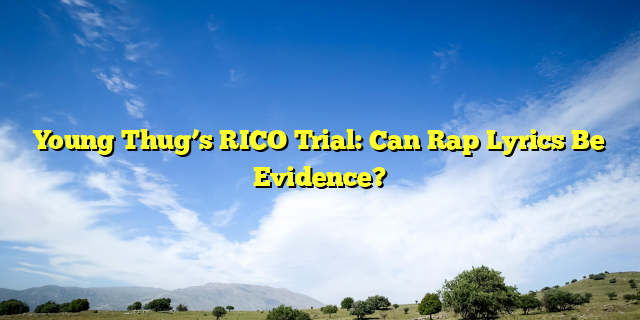The high-profile RICO trial of Grammy-winning rapper Young Thug (Jeffery Lamar Williams) raises complex legal questions about the intersection of artistic expression and criminal prosecution. Accused alongside eleven others, Williams faces multiple RICO charges in Fulton County, Georgia, with prosecutors alleging his music and lyrics are not just art, but evidence of gang activity and incitement to violence. This trial, projected to last 6-9 months, delves into the heart of Georgia’s RICO law and the boundaries of First Amendment protections.
Understanding the RICO Charges Against Young Thug
Young Thug, the CEO of his own record label, Young Stoner Life (YSL), is accused of co-founding a criminal street gang also known as YSL, affiliated with the national Bloods gang. Fulton County prosecutors allege this group is responsible for a pattern of violent crimes in Atlanta, including murder, aggravated assault, armed robbery, carjacking, theft, and drug dealing. The prosecution’s case hinges on the argument that Young Thug’s music, specifically his lyrics, serves to recruit new members and incite violence, placing it squarely within the purview of Georgia’s RICO statute.
Georgia’s RICO Act: A Powerful Legal Tool
The Racketeer Influenced and Corrupt Organizations Act (RICO) exists at both the federal and state levels. Georgia is one of six states with its own RICO law, which is even broader than the federal version. It allows for prosecution of individuals engaged in a “pattern of unlawful conduct” encompassing a wide range of offenses, including those listed above. Crucially, Georgia’s RICO statute also criminalizes conspiracy to engage in such conduct, even without direct participation in the criminal acts themselves. This is a key element in the prosecution’s case against Young Thug, as they argue his lyrics constitute a form of conspiratorial incitement to violence.
Image: Young Thug during a court appearance.
Rap Lyrics as Evidence: A First Amendment Dilemma
The prosecution’s intention to use Young Thug’s lyrics as evidence raises significant First Amendment concerns. While freedom of speech is a cornerstone of American law, it is not absolute. The Supreme Court has established that speech inciting imminent lawless action is not protected. District Attorney Fani Willis argues that Young Thug’s lyrics fall into this category, constituting “overt and predicate acts” within the RICO framework.
Lines like, “I never killed anybody, but I got something to do with that body,” and “I told them to shoot a hundred rounds,” from his song “Anybody,” are central to the prosecution’s case. They argue these are not simply artistic expressions, but direct incitements to violence, furthering the alleged criminal enterprise of YSL.
The Defense’s Argument: Artistic Expression, Not Criminal Conduct
Young Thug’s defense maintains his innocence, asserting the indictment is frivolous and his lyrics are protected artistic expression. They argue that interpreting rap lyrics literally as evidence of criminal intent ignores the genre’s artistic conventions, which often involve hyperbole, metaphor, and storytelling. The defense will likely contend that using lyrics in this way sets a dangerous precedent, potentially chilling artistic expression and criminalizing creative storytelling. The trial will ultimately determine whether the jury interprets Young Thug’s words as artistic expression or as evidence of criminal conspiracy.
Image: Young Thug performing on stage.
The Precedent-Setting Potential of the Young Thug Trial
The outcome of this trial could have far-reaching implications for the music industry and freedom of artistic expression. If Young Thug’s lyrics are deemed admissible as evidence of criminal activity, it could set a precedent for using artistic works against other artists, potentially leading to self-censorship and a chilling effect on creative expression. Conversely, a ruling in favor of Young Thug could reaffirm the broad protections afforded by the First Amendment, even in the context of controversial artistic content.
Key Legal Questions to Consider
This trial raises several crucial legal questions:
- Context and Intent: How will the jury interpret the meaning and intent behind Young Thug’s lyrics? Will they consider the artistic context of rap music, or focus solely on the literal meaning of the words?
- First Amendment Protections: Where is the line between protected artistic expression and unprotected incitement to violence? Does the prosecution’s interpretation of Young Thug’s lyrics infringe upon his First Amendment rights?
- Precedent and Future Implications: How will the outcome of this trial affect future cases involving artistic expression and criminal charges? Will it create a new legal standard for evaluating artistic works as evidence?
Image: A gavel, symbolizing the legal proceedings.
Conclusion: A Landmark Case for Music and Law
The Young Thug RICO trial is a landmark case that will shape the future intersection of music, law, and freedom of speech. The jury’s decision will have profound implications, not only for Young Thug’s future but also for the broader landscape of artistic expression and the limits of First Amendment protections. The trial forces us to grapple with complex questions about artistic intent, the interpretation of creative works, and the potential for criminalizing artistic expression. The world will be watching as the legal system navigates this complex and potentially precedent-setting case.

